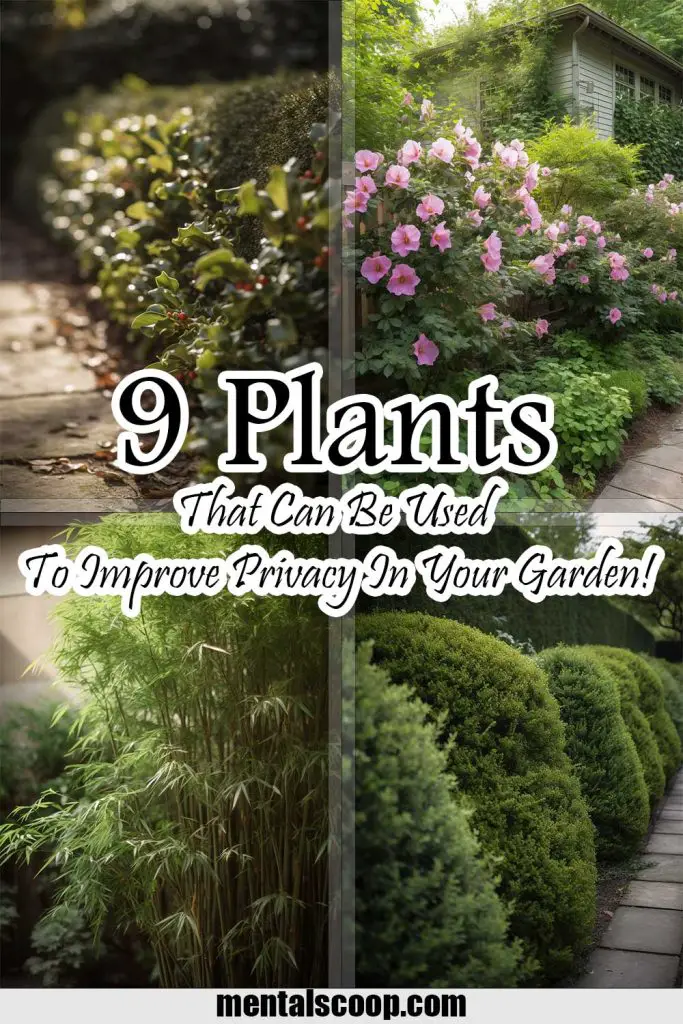
As urbanization continues to spread, privacy is becoming a luxury that is becoming harder to come by. Whether you live in an apartment complex, townhouse, or a home in the suburbs, it can be challenging to keep your property secluded from prying eyes.
Fortunately, there are several plants that can help you create a private space around your home, balcony, or backyard. Here are nine plants that are good for improving privacy.
Bamboo
Bamboo is an excellent option for creating a privacy screen, and there are many different types of bamboo to choose from, depending on your needs. Some species of bamboo grow quickly and are ideal for creating an instant screen.
Others take longer to grow but are more durable and provide better coverage. Bamboo is also a low-maintenance plant that requires little attention once established. However, it can be invasive, so it’s important to choose a clumping variety and to plant it in a contained area to prevent it from spreading.
Arborvitae
Arborvitae is a popular evergreen tree that is commonly used for creating privacy hedges. It is a fast-growing tree that can reach up to 60 feet in height, but it is also easy to maintain at a lower height. Arborvitae is also a hardy tree that can withstand harsh weather conditions, making it a good option for those living in colder climates. The tree’s dense foliage also makes it an effective barrier against noise and wind.
Boxwood
Boxwood is a popular plant for creating formal hedges and topiaries, but it is also an effective plant for privacy screens. It is a slow-growing shrub that can reach up to 10 feet in height, but it can be easily pruned to maintain a lower height. Boxwood is also a versatile plant that can be planted in a variety of soil types and light conditions.
Holly
Holly is another evergreen tree that is commonly used for creating privacy hedges. It is a slow-growing tree that can reach up to 50 feet in height, but it is also easy to maintain at a lower height. Holly trees are also known for their attractive red berries, which can add visual interest to your privacy screen.
Privet
Privet is a popular shrub for creating privacy hedges because of its dense foliage and fast growth rate. It is a deciduous shrub that can reach up to 20 feet in height, but it is also easy to maintain at a lower height. Privet is also a low-maintenance plant that requires little attention once established, but it can be invasive if not pruned regularly.
Leyland Cypress
Leyland Cypress is a popular evergreen tree that is commonly used for creating privacy screens. It is a fast-growing tree that can reach up to 70 feet in height, but it is also easy to maintain at a lower height. Leyland Cypress is also a hardy tree that can withstand harsh weather conditions, making it a good option for those living in colder climates. The tree’s dense foliage also makes it an effective barrier against noise and wind.
Rhododendron
Rhododendron is a popular flowering shrub that is commonly used for creating privacy screens. It is a slow-growing shrub that can reach up to 15 feet in height, but it can be easily pruned to maintain a lower height. Rhododendron is also a versatile plant that can be planted in a variety of soil types and light conditions, but it requires regular watering and fertilizer.
Rose of Sharon
Rose of Sharon is a popular flowering shrub that is commonly used for creating privacy screens. It is a fast-growing shrub that can reach up to 12 feet in height, but it is also easy to maintain at a lower height. Rose of Sharon is also a hardy plant that can withstand drought conditions, making it a good option for those living in arid climates. The plant’s showy flowers, which bloom in late summer and fall, can also add visual interest to your privacy screen.
Juniper
Juniper is a popular evergreen shrub that is commonly used for creating privacy screens. It is a low-maintenance plant that is easy to care for and can grow in a variety of soil types and light conditions. Juniper is also a hardy plant that can withstand harsh weather conditions, making it a good option for those living in colder climates. The shrub’s dense foliage also makes it an effective barrier against noise and wind.
Overall
When choosing plants for your privacy screen, it is important to consider your specific needs and the conditions of your property. Some plants may be better suited for certain climates or soil types, while others may require more maintenance than others. It is also important to consider the height and width of the plants you choose, as well as their growth rate and invasive potential.
In addition to providing privacy, plants can also help to improve the overall aesthetic of your property. Consider choosing plants that have attractive foliage or flowers to add visual interest to your privacy screen. You may also want to consider adding outdoor lighting or other features to enhance the ambiance of your outdoor space.
Size Chart
| Plant Name | Typical Height | Typical Width |
|---|---|---|
| Bamboo | 15-60 feet | 1-6 feet |
| Arborvitae | 10-60 feet | 4-15 feet |
| Boxwood | 3-10 feet | 3-10 feet |
| Holly | 15-50 feet | 15-25 feet |
| Privet | 6-20 feet | 4-8 feet |
| Leyland Cypress | 50-70 feet | 15-25 feet |
| Rhododendron | 4-15 feet | 4-12 feet |
| Rose of Sharon | 8-12 feet | 4-6 feet |
| Juniper | 6-18 feet | 6-15 feet |
Please note that these are general guidelines and actual height and width can vary based on growing conditions and specific cultivars. It is important to research and choose the appropriate plant for your specific needs and growing conditions.

More interesting articles you may be interested in reading:

How To Remove A Tree Stump Painlessly
10 Vital Home Maintenance Tasks You’ll Regret If You Forget
See How Much Propane Is Left In A Tank With No Gauge
Thanks for reading and be sure to share this info with your friends using the social share buttons below.
Talking about social stuff, consider liking our Facebook page to keep up to date with our articles. Check out our other articles for more mental scoops!
